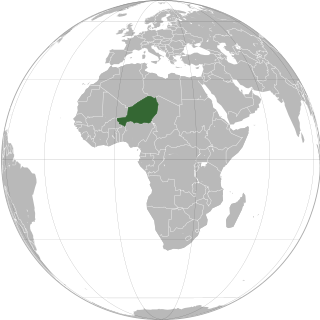
Niger or the Niger, officially the Republic of the Niger, is a landlocked country in West Africa. It is a unitary state bordered by Libya to the northeast, Chad to the east, Nigeria to the south, Benin and Burkina Faso to the southwest, Mali to the west, and Algeria to the northwest. It covers a land area of almost 1,270,000 km2 (490,000 sq mi), making it the largest landlocked country in West Africa. Over 80% of its land area lies in the Sahara. Its predominantly Muslim population of about 25 million lives mostly in clusters in the south and west of the country. The capital Niamey is located in Niger's southwest corner.
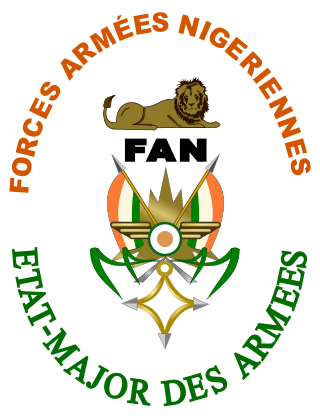
The Niger Armed Forces includes military armed force service branches, paramilitary services branches and the National Police of Niger. The Army, Air Force and the National Gendarmerie are under the Ministry of Defense whereas the National Guard and the National Police fall under the command of the Ministry of Interior. With the exception of the National Police, all military and paramilitary forces are trained in military fashion. The President of Niger is the supreme commander of the entire armed forces. The National Assembly of Niger passed a statute for the Army of Niger on November 2020, planning for the army's size to increase from 25,000 personnel in 2020, to 50,000 in 2025 and finally 100,000 in 2030.

The Tuareg people are a large Berber ethnic group that principally inhabit the Sahara in a vast area stretching from far southwestern Libya to southern Algeria, Niger, Mali, and Burkina Faso. Traditionally nomadic pastoralists, small groups of Tuareg are also found in northern Nigeria.

Agadez, formerly spelled Agadès, is the fifth largest city in Niger, with a population of 110,497 based on the 2012 census. The capital of Agadez Region, it lies in the Sahara desert, and is also the capital of Aïr, one of the traditional Tuareg–Berber federations. The historic centre of the town has been designated a World Heritage Site by UNESCO.

Azawad, or Azawagh, was a short-lived unrecognised state lasting from 2012 to 2013. Azawagh (Azawaɣ) is the generic Tuareg Berber name for all Tuareg Berber areas, especially the northern half of Mali and northern and western Niger. The Azawadi declaration of independence was declared unilaterally by the National Movement for the Liberation of Azawad (MNLA) in 2012, after a Tuareg rebellion drove the Malian Armed Forces from the region.

From 1990 to 1995, a rebellion by various Tuareg groups took place in Niger and Mali, with the aim of achieving autonomy or forming their own nation-state. The insurgency occurred in a period following the regional famine of the 1980s and subsequent refugee crisis, and a time of generalised political repression and crisis in both nations. The conflict is one in a series of Tuareg-based insurgencies in the colonial and post-colonial history of these nations. In Niger, it is also referred to as the Second or Third Tuareg Rebellion, a reference to the pre-independence rebellions of Ag Mohammed Wau Teguidda Kaocen of the Aïr Mountains in 1914 and the rising of Firhoun of Ikazkazan in 1911, who reappeared in Mali in 1916. In fact the nomadic Tuareg confederations have come into sporadic conflict with the sedentary communities of the region ever since they migrated from the Maghreb into the Sahel region between the 7th and 14th centuries CE. Some Tuareg wanted an independent Tuareg nation to be formed when French colonialism ended. This, combined with dissatisfaction over the new governments, led some Tuareg in Northern Mali to rebel in 1963.
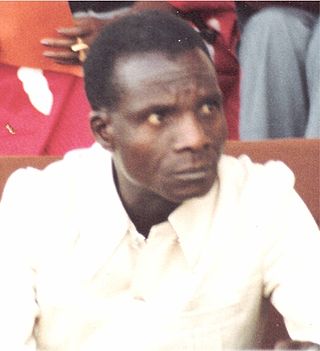
Seyni Kountché was a Nigerien military officer who led a 1974 coup d'état that deposed the government of Niger's first president, Hamani Diori. He ruled the country as military head of state from 17 April 1974 until his death on 10 November 1987. Stade Général Seyni Kountché, Niger's national stadium in Niamey, is named after him.
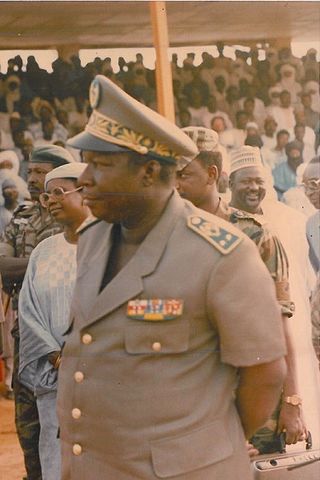
Ali Saibou was the third President of Niger from 1987 to 1993 succeeding the deceased Seyni Kountché.

FROLINAT was an insurgent rebel group active in Chad between 1966 and 1993.
The Liberation Front of Chad was an insurgent group active between 1965 and 1976 during the first phase of the Chadian Civil War.

Mano Dayak International Airport is an airport in Agadez in Niger. It is named after Mano Dayak, a Tuareg leader.
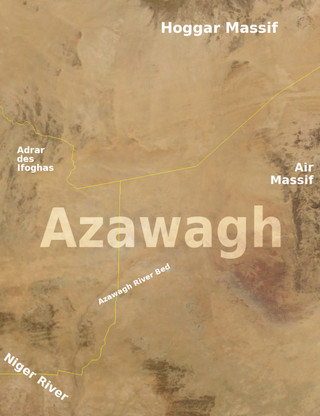
The Azawagh is a dry basin covering what is today the northwestern Niger, as well as parts of northeastern Mali and southern Algeria. The Azawagh is mainly made up of Sahelian and Saharan flatlands and has a population that is predominantly Tuareg, with some Arabic-speaking and Wodaabe minorities and a recent influx of Hausa and Zarma.

The 2007-2009 Tuareg rebellion was an insurgency that began in February 2007 amongst elements of the Tuareg people living in the Sahara desert regions of northern Mali and Niger. It is one of a series of insurgencies by formerly nomadic Tuareg populations, which had last appeared in the mid-1990s, and date back at least to 1916. Populations dispersed to Algeria and Libya, as well as to the south of Niger and Mali in the 1990s returned only in the late 1990s. Former fighters were to be integrated into national militaries, but the process has been slow and caused increased resentment. Malian Tuaregs had conducted some raids in 2005–2006, which ended in a renewed peace agreement. Fighting in both nations was carried on largely in parallel, but not in concert. While fighting was mostly confined to guerrilla attacks and army counterattacks, large portions of the desert north of each nation were no-go zones for the military and civilians fled to regional capitals like Kidal, Mali and Agadez, Niger. Fighting was largely contained within Mali's Kidal Region and Niger's Agadez Region. Algeria helped negotiate an August 2008 Malian peace deal, which was broken by a rebel faction in December, crushed by the Malian military and wholescale defections of rebels to the government. Niger saw heavy fighting and disruption of uranium production in the mountainous north, before a Libyan backed peace deal, aided by a factional split among the rebels, brought a negotiated ceasefire and amnesty in May 2009.
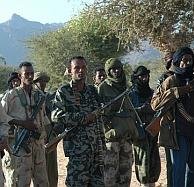
The Nigerien's Movement for Justice is a largely Tuareg ethnic, northern Niger based militant group. But the MNJ also includes other nomadic ethnicities, within this area, such as the Toubou and the Fulani have also joined the group, which has been battling the Niger government since 2007.

The Union for Democracy and Social Progress is a centrist political party in Niger. With its support base in the Tuareg people of northern Niger, the party's history is tied up with that of the Tuareg rights movements which surrounded the Tuareg insurgencies of 1990–95 and 2007–09. Its slogan, "Amana", is a Hausa language word for "Trust"
Rhissa Ag Boula is a Nigerien Tuareg politician and former leader of rebel factions in both the 1990–1995 and the 2007–2009 Tuareg based Insurgencies. He was Nigerien Minister of Tourism from 1996–1999, and again from 1999–2004. His arrest on murder charges in 2004 precipitated armed conflict between his supporters and the Nigerien government. A political leader following the 1995 peace, he again joined a rebel faction from abroad in 2007, creating his own faction from abroad in 2008, and joining the peace process in 2009. In 2010 he was again arrested after returning to Niger. In 2023 he announced the creation of the Council of Resistance for the Republic which aimed to topple the junta and restore Bazoum to office. He also said that it supported international intervention by ECOWAS and other actors in doing so.
Abdoulaye Hamani Diori was a Nigerien political leader and businessman. The son of Niger's first President, he waged a political and abortive military struggle against the Military regime that overthrew his father. With the return of democracy to Niger, Abdoulaye became head of his father's political party, and maintained a small but influential place in the political life of Niger until his death in 2011. Abdoulaye was married with four children. A Muslim, he earned the honorific 'Hadji' after making the pilgrimage to Mecca. He died 25 April 2011 at National Hospital in Niamey, aged 65, following an illness.
The Dawsahak people, Idaksahak are pastoralist Berbers centered on Ménaka and Inékar town in Ménaka Region and Talataye in Ansongo Cercle of the Gao Region of northeastern Mali. They speak the Northern Songhai language Tadaksahak. Many also speak Western Tawallammat Tamajaq language, the Tuareg language of southern Gao. Daoussahak appears to be the most common transliteration of the collective name among French and English academics.
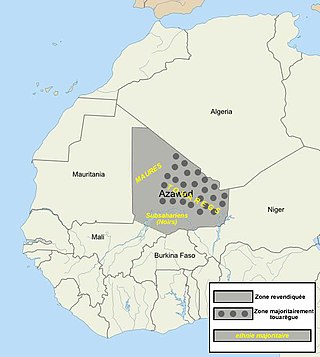
The 2012 Tuareg rebellion was the early phase of the Mali War; from January to April 2012, a war was waged against the Malian government by rebels with the goal of attaining independence for the northern region of Mali, known as Azawad. It was led by the National Movement for the Liberation of Azawad (MNLA) and was part of a series of insurgencies by traditionally nomadic Tuaregs which date back at least to 1916. The MNLA was formed by former insurgents and a significant number of heavily armed Tuaregs who fought in the Libyan Civil War.

The National Movement for the Liberation of Azawad or the Azawad National Liberation Movement, formerly the National Movement of Azawad, is a political and military organization based in Azawad in northern Mali.













